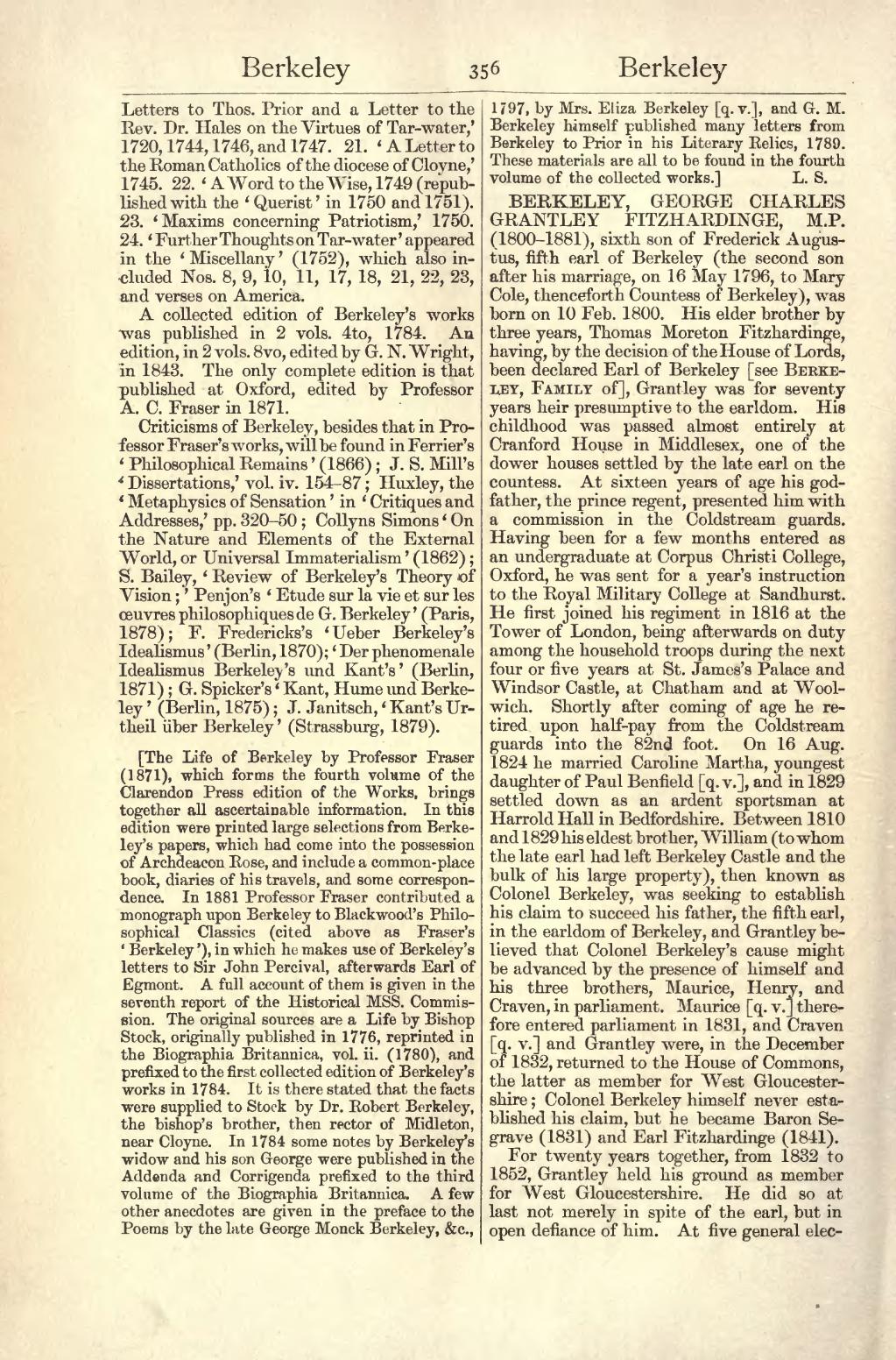Letters to Thos. Prior and a Letter to the Rev. Dr. Hales on the Virtues of Tar-water,' 1720, 1744, 1746, and 1747. 21. 'A Letter to the Roman Catholics of the diocese of Cloyne,' 1745. 22. 'A Word to the Wise, 1749 (republished with the 'Querist' in 1750 and 1751). 23. 'Maxims coucerning Patriotism,' 1750. 24. 'Further Thoughts on Tar-water' appeared in the 'Miscellany' (1752), which also included Nos. 8, 9, 10, 11, 17, 18, 21, 22, 23, and verses on America.
A collected edition of Berkeley's works was published in 2 vols. 4to, 1784. An edition, in 2 vols. 8vo, edited by G. N. Wright, in 1843. The only complete edition is that published at Oxford, edited by Professor A. C. Fraser in 1871.
Criticisms of Berkeley, besides that in Professor Fraser's works, will be found in Ferrier's 'Philosophical Remains' (1866); J. S. Mill's 'Dissertations,' vol. iv. 154-87; Huxley, the 'Metaphysics of Sensation' in 'Critiques and Addresses,' pp. 320-50; Collyns Simons 'On the Nature and Elements of the External World, or Universal Immaterialism' (1862); S. Bailey, 'Review of Berkeley's Theory of Vision;' Penjon's 'Etude sur la vie et sur les œuvres philosophiques de G. Berkeley' (Paris, 1878); F. Fredericks's 'Ueber Berkeley's Idealismus' (Berlin, 1870): 'Der phenomenale Idealismus Berkeley's and Kant's' (Berlin, 1871); G. Spicker's Kant, Hume und Berkeley' (Berlin, 1875); J. Janitsch, 'Kant's Urtheil über Berkeley' (Strassburg, 1879).
[The Life of Berkeley by Professor Fraser (1871), which forms the fourth volume of the Clarendon Press edition of the Works, brings together all ascertainable information. In this edition were printed large selections from Berkeley's papers, which had come into the possession of Archdeacon Rose, and include a common-place book, diaries of his travels, and some correspondence. In 1881 Professor Fraser contributed a monograph upon Berkeley to Blackwood's Philosophical Classics (cited above as Fraser's 'Berkeley'), in which he makes use of Berkeley's letters to Sir John Percival, afterwards Earl of Egmont. A full account of them is given in the seventh report of the Historical MSS. Commission. The original sources are a Life by Bishop Stock, originally published in 1776, reprinted in the Biographia Britannica. vol. ii. (1780), and prefixed to the first collected edition of Berkeley's works in 1784. It is there stated that the facts were supplied to Stock by Dr. Robert Berkeley, the bishop's brother, then rector of Midleton, near Cloyne. In 1784 some notes by Berkeley's widow and his son (George were published in the Addenda and Corrigenda prefixed to the third volume of the Biographia Britannica. A few other anecdotes are given in the preface to the Poems by the late George Monck Berkeley, &c., 1797, by Mrs. Eliza Berkeley [q. v.], and G. M. Berkeley himself published many letters from Berkeley to Prior in his Literary Relics, 1789. These materials are all to be found in the fourth volume of the collected works.]
BERKELEY, GEORGE CHARLES GRANTLEY FITZHARDINGE, M.P. (1800–1881), sixth son of Frederick Augustus, fifth earl of Berkeley (the second son after his marriage, on 16 May 1796, to Mary Cole, thenceforth Countess of Berkeley), was born on 10 Feb. 1800. His elder brother by three years, Thomas Moreton Fitzhardinge, having, by the decision of the House of Lords, been declared Earl of Berkeley [see Berkeley, Family of], Grantley was for seventy years heir presumptive to the earldom. His childhood was passed almost entirely at Cranford House in Middlesex, one of the dower houses settled by the late earl on the countess. At sixteen years of age his godfather, the prince regent, present him with a commission in the Coldstream guards. Having been for a few months entered as an undergraduate at Corpus Christi College, Oxford, he was sent for a year's instruction to the Royal Military College at Sandhurst. He first joined his regiment in 1816 at the Tower of London, being afterwards on duty among the household troops during the next four or five years at St. James's Palace and Windsor Castle, at Chatham and at Woolwich. Shortly after coming of age he retired upon half-pay from the Coldstream guards into the 82nd foot. On 16 Aug. 1824 he married Caroline Martha, youngest daughter of Paul Benfield [q. v.], and in 1829 settled down as an ardent sportsman at Harrold Hall in Bedfordshire. Between 1810 and 1829 his eldest brother, William (to whom the late earl had left Berkeley Castle and the bulk of his large property), then known as Colonel Berkeley, was seeking to establish his claim to succeed his father, the fifth earl, in the earldom of Berkeley, and Grantley believed that Colonel Berkeley's cause might be advanced by the presence of himself and his three brothers, Maurice, Henry, and Craven, in parliament. Maurice [q. v.] therefore entered parliament in 1831, and Craven [q. v.] and Grantley were, in the December of 1832, returned to the House of Commons, the latter us member for West Gloucestershire; Colonel Berkeley himself never established his claim, but he became Baron Segrave (1831) and Earl Fitzhardinge (1841).
For twenty years together, from 1832 to 1852, Grantley held his ground as member for West Gloucestershire. He did so at last not merely in spite of the earl, but in open defiance of him. At five general elec-
